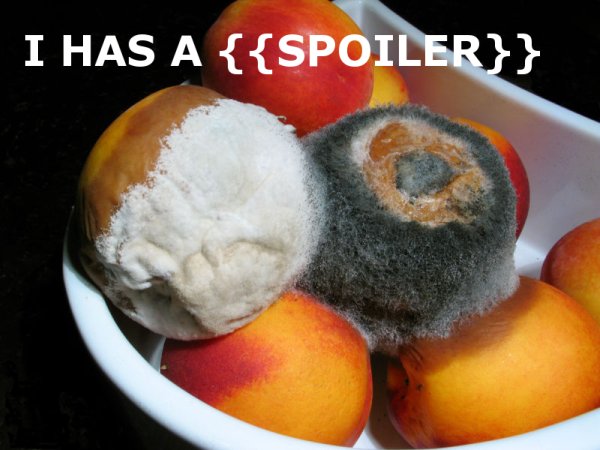- Science proves that trolls really are a bunch of dicks.
This proves Phil Sandifer‘s deep evil. Superlative call, sir.
I’m slightly surprised, if pleased, at the pent-up hatred for the {{spoiler}} tag’s overapplication. It actually survived a deletion nomination last year, but the arguments for its grossly unencyclopedic nature and direct incitement to violate and defend violations of neutrality this time are much more convincing. Particularly the examples of the sort of misuse its presence fosters — did you know this thing had been placed on Anagram and Kiss? I thought this was the most unthinkingly process-over-product edit (complete with txt spk) I’d seen on the wiki yesterday, then I saw this.
I expect the tag will not be killed utterly, but I do expect its application will be severely curtailed. Someone’s already helpfully noted that if there’s a “Plot”, “Summary”, “Synopsis” or similar header, then, duh, there are going to be plot elements therein. Personally, I’d favour the German Wikipedia’s spoiler warning policy, which Babelfish and I loosely translate as:
When discussing creative works, e.g. books, music, computer games, TV series or films, an encyclopedia’s task is to give a summary of the work and its place in the overall field. Thus, it is natural that the action of a book or a film will be described and discussed in full.
Many books or films lose their attraction, however, if too many details or the ending are revealed before they are read or seen. So it became common on the Internet to put a spoiler warning before such descriptions.
In encyclopedias, however, this is rare. In the German language Wikipedia, after long discussions, consensus developed not to include spoiler warnings, and to remove existing ones. The section which contains a description of the plot should, however, always be clearly denoted, for example by the heading ==Plot summary==.
Why deal with bad policies by nominating them for deletion? Because processes are generally held responsible for their widespread misuse. If the idea is good but the process is bad, the idea doesn’t justify saving the process. (Of course, I expect IAR will quite properly continue to ignore this.) I am enormously pleased that in this case, it was done by direct attention to core policies and detailed demonstration of how it violates those.
As Doc glasgow notes: “I mean that Prince Charming marries the girl is a plot twist you’d never expect ;)”
By Kat Walsh. Based on Moldy nectarines by Roger McLassus. GFDL.

Your link points to an edit-war over {{spoiler}} on Three Little Pigs, but that’s only part of the story. So how did it get there in the first place?
I traced it back to this edit, made by an anon editor in February — the only edit from that IP address. A little more probing matches that IP address to a dial-up node at Sonic.net, located in Southern California. Seeing how it appeared during a period when this article saw repeated vandalism, I’m guessing that it was added as a joke in the first place. Sad thing is that people actually thought it was serious, & fought to keep this template.
From stupid little jokes, mighty flame wars grow.
Geoff
I remember getting voted down when attempting to defend my placement of spoiler tags on the page about Pepys’ Diary.